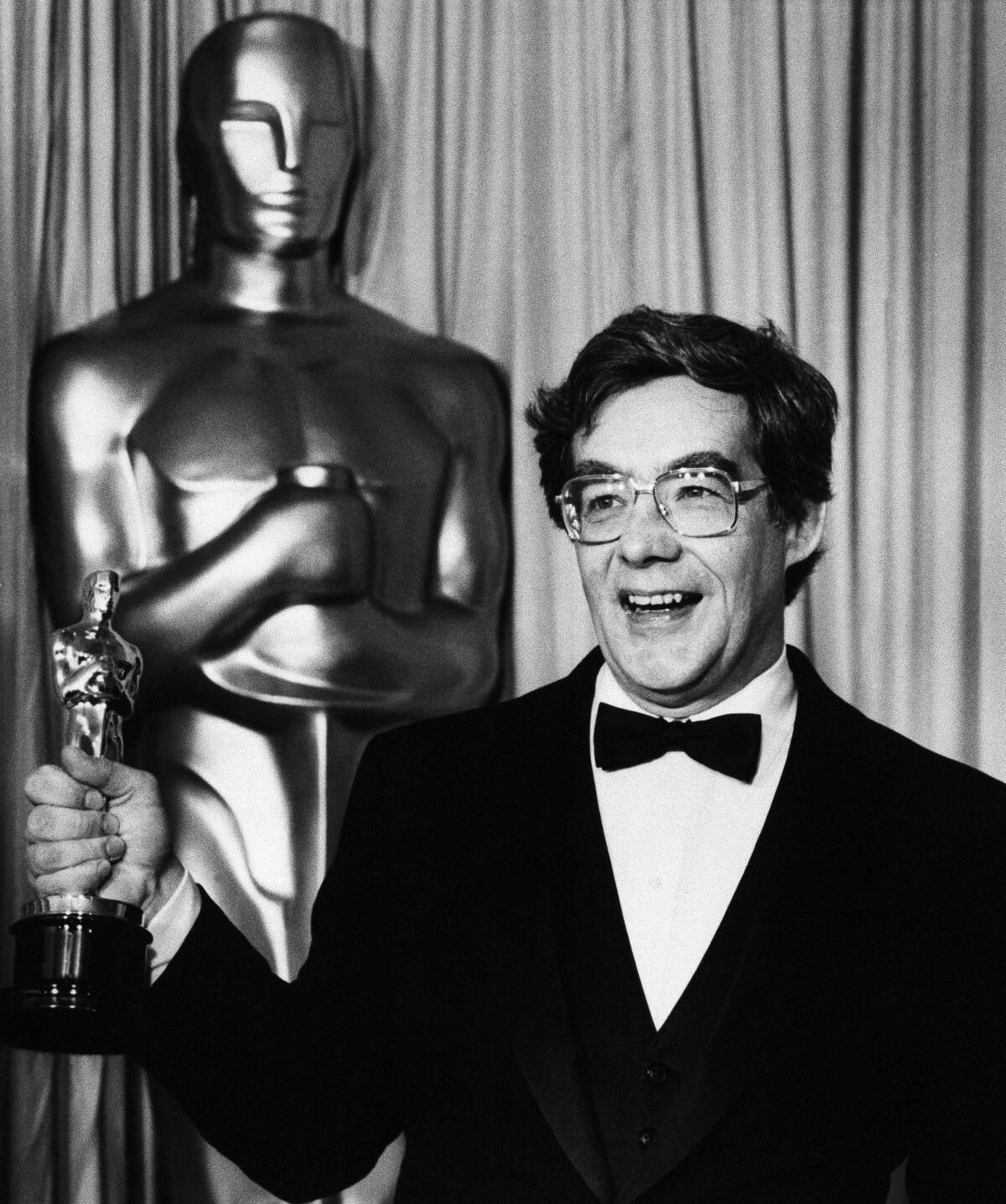Kurt Luedtke, journalist who wrote âOut of Africaâ and âAbsence of Maliceâ screenplays, dies

Kurt Luedtke, who rose to be the top editor of a major American newspaper by the age of 33 and then abruptly left journalism to become an Oscar-winning Hollywood screenwriter on films such as âOut of Africaâ and âAbsence of Malice,â has died after a prolonged illness.
Luedtke died Sunday at a hospital in Royal Oak, Mich., his wife, Eleanor, said. He was 80.
Luedtkeâs first film, 1981âs âAbsence of Malice,â starring Sally Field and Paul Newman, was a dark drama about a reporter whose multiple ethical lapses led to tragedy. It earned him an Oscar nomination for original screenplay.
Four years later, his second movie, âOut of Africa,â starring Meryl Streep and Robert Redford, cleaned up at the Academy Awards, winning seven Oscars, including best picture and, for Luedtke, screenplay based on material from another medium. Luedtkeâs collaborator on both projects, Sidney Pollack, won for directing.
Luedtke explained his decision to change careers as âOut of Africaâ was about to premiere. He told a Detroit Free Press reporter he had been named executive editor of the paper â âthe best job that I could possibly get in journalism when I was relatively youngâ â and he took stock five years later and thought to himself, âI could literally look forward to 27 more years of it and then retirement. And I thought: âGood Lord, thatâs impossible!ââ
So he resigned with vague ambitions to somehow break into the movies or television. He flew to Hollywood to pursue the dream, with no experience and no contacts.
âIâve always, as you know, been undeterred by common sense,â he said in the 1985 Free Press interview.
Luedtkeâs first idea was to write a novel about newspapering and sell the film rights. A relative gave him the name of a college friend who worked at Orion Pictures, Luedtke told Free Press film critic Jack Mathews in 1981. The Orion executive listened to the story concept and thought enough of it to set up a meeting with director George Roy Hill. Eleanor had to tell her husband that Hill was the director who made âButch Cassidy and the Sundance Kid.â
Hill liked Luedtkeâs proposal, and Orion gave him a $20,000 advance to write an outline. Luedtke agreed, as long as the studio would give him back the idea if they chose not to film it.
In the end, Hill decided to do a different movie, and Luedtke wound up working with Pollack. The director later told Matthews that when he saw the outline and a first draft of a screenplay for âAbsence of Malice,â he âdidnât know if it could be made into a movie. ⌠It needed a lot of work.â
Pollack and Luedtke spent an intense three days rewriting it and Pollack said he knew in the end they had succeeded.
âKurt is one of the fastest and most inexhaustible writers Iâve ever worked with,â he said. âWe had to come up with major changes overnight, and heâd do it.â
With the success of âAbsence of Malice,â Luedtke persuaded Pollack to buy the film rights to five books so that he could pull together the life story of a Danish aristocrat, Baroness Karen Blixin, who moved to East Africa in the early 20th century, married her loverâs brother, ran a coffee plantation and had a love affair with a British nobleman and big game hunter. When her plantation eventually went broke, Blixin returned to Denmark and wrote books about her time in Africa under the pen name Isak Dinesen.
âI just wanted to do it,â Luedtke said as the movie was about to come out. He said he had read Dinesenâs books as a teenager. âI was already in love with Africa and fell more in love â not just with Africa but with the woman who wrote those books.â
It was considered a risky project. Luedtke said: âItâs silly for me to say, because you really canât tell yet, but I think weâre going to make our money back.â That turned out to be an understatement. In addition to all the Academy Awards, âOut of Africaâ grossed more than $258 million worldwide and was the fifth highest grossing film in the United States and Canada that year. It earned more than 10 times its investment.
Luedtke and Pollack would make one more picture together, âRandom Heartsâ in 1999, starring Harrison Ford and Kristin Scott Thomas. It did not enjoy the success of their first two films.
Kurt Mamre Luedtke was born in Grand Rapids, Mich., to Herman and Virginia Luedtke. His father was a lumber broker.
Luedtke graduated from Brown University in 1961 and worked at the Grand Rapids Press and a television station in his hometown. He attended law school at the University of Michigan but left to cover the attempt by James Meredith to integrate the all-white University of Mississippi . Now focused on journalism, Luedtke enrolled in graduate school at Northwestern University.
He never finished because a summer internship in 1963 at the Miami Herald turned into a full-time job.
Luedtke was soon a full-time reporter at the Herald, where he met his future wife, Eleanor Kruglinski. They married in 1965 and moved to Detroit, where he joined the Free Press.
Luedtke started at the Free Press as a reporter but quickly moved up the newsroom ranks â assistant city editor, photo editor, assistant managing editor, assistant to the executive editor and finally executive editor in 1973.
As an assistant city editor in 1967, Luedtke was a key driver of the newspaperâs Pulitzer Prize-winning coverage of that summerâs Detroit riots, one of the worst racial uprisings in American history.
At one point, he and a colleague covering the violence that led to 43 deaths and more than 300 injuries were forced by Michigan National Guardsmen to lie on a street at bayonet-point while shots rang out all around. In the immediate aftermath of the rioting, Luedtke wrote a front-page story revealing that federal and local law enforcement officials were investigating the deaths of three Black teenagers. Authorities feared the youths were deliberately executed, he reported. Three police officers and a private security guard would later be charged. All were acquitted.
Three reporters were later assigned to investigate every death, conducting more than 300 interviews in the process. Early on a Saturday morning, Luedtke sat at a typewriter in the newsroom and compiled all their notes into a masterful reconstruction that ran in the Sunday paper, headlined, âThe 43 Who Died.â The storyâs conclusion was that few of the dead were rioters and most of the deaths could and should have been prevented.
Peter Gavrilovich, who spent 44 years at the paper as a reporter and editor, said that the paperâs city editor âtook the takes from Kurt, made the paragraph marks and just sent to composing. It was flawless. And that work led to the Pulitzer for the staff.â
As a script writer in his second career, Luedtke often agonized over virtually every word, just as he had as a journalist.
He once said he was struggling with how to tie up an ending and turned to the Detroit-based mystery novelist Elmore Leonard for help. Leonard listened on the phone for a while as Luedtke described various possible approaches, then interrupted him and cut short their conversation with blunt advice: âKurt, just write the goddamn thing.â
Luedtkeâs journalism movie, âAbsence of Malice,â was controversial with many in the trade, who preferred the heroic portrayal of reporters in 1976âs âAll the Presidentâs Men,â which told the story of how the Washington Postâs Bob Woodward and Carl Bernstein pursued the Watergate scandal that brought down President Nixon. But âAbsence of Maliceâ would eventually become assigned viewing at an ethics class at the Columbia University Graduate School of Journalism.
It was praised by New York Times critic Janet Maslin, who wrote that the performances by the large supporting cast, including the late Wilford Brimley, were âextremely goodâ because of the way Luedtke had written their scenes.
Film critic Roger Ebert called the movie âabsorbing and entertaining,â although he wrote that he doubted any journalist would commit as many ethical breaches as Sally Fieldâs character did â publishing a story from a single anonymous source without checking it out, starting a romantic relationship with the subject of the story, revealing deeply personal information about a private figure that drives her to suicide.
Looking back on his transition from newspaper editor to aspiring screenwriter, Luedtke told Mathews:
âWhen I was executive editor of the Free Press, if I needed to reach the governor or Henry Ford, there was a good chance I could do it. When I left the paper, I was happy if secretaries would return my call.
âWhen youâre out of work, humility finds you in a hurry.â
Luedtke is survived by his wife of 55 years.
Hoyt is a special correspondent.
More to Read
Start your day right
Sign up for Essential California for the L.A. Times biggest news, features and recommendations in your inbox six days a week.
You may occasionally receive promotional content from the Los Angeles Times.






